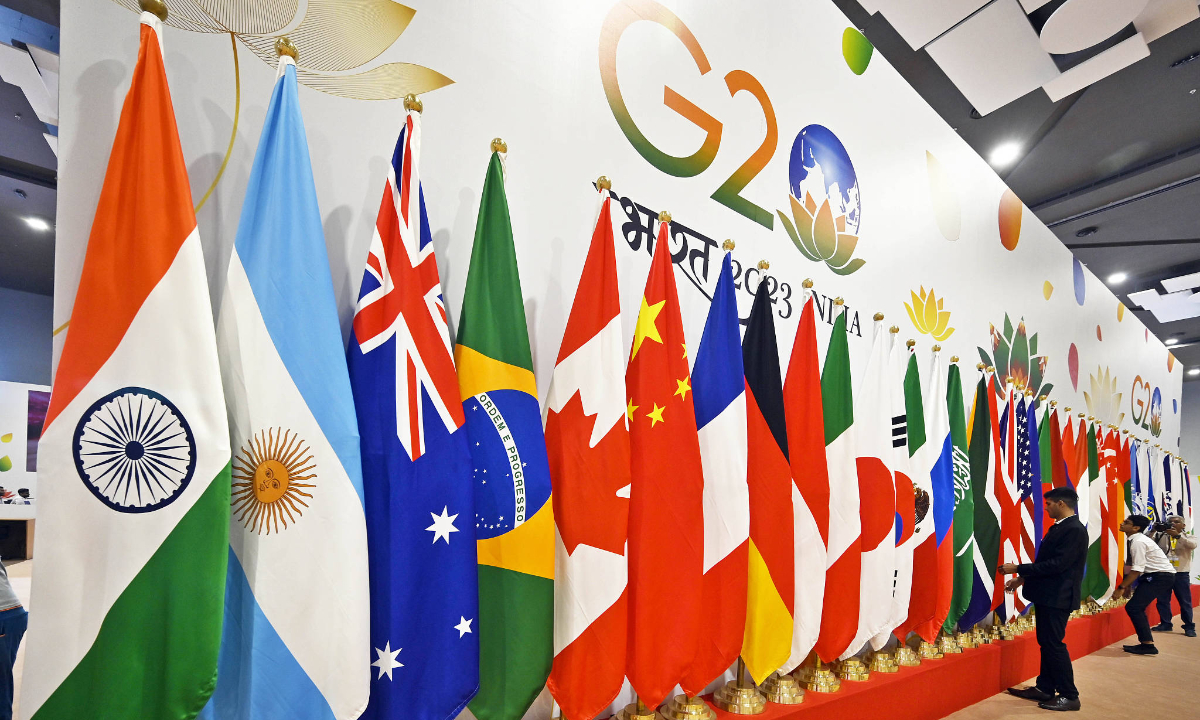
G20 Photo:VCG
The 18th G20 Summit has concluded in New Delhi. As it was the first time for India to host such a large-scale multilateral event, this summit received more attention than normal. At the invitation of India, Chinese Premier Li Qiang attended the summit and elaborated on China's views and positions on G20 cooperation, contributing to the fruitful outcomes of the summit with its unwavering support for developing countries and its commitment to common development.
Strangely enough, rumors spread that China does not pay enough attention to the G20 since the delegation was not headed by the president, that China favors BRICS over the G20 and intends to enlarge the former to replace the latter. Do these arguments stand?
As a founding member of and active contributor to the G20, China has always attached great importance to this group and supported its work. It shares its ideas and proposals with G20 partners to improve global economic governance, such as promoting inclusive and innovative global growth, and calling for making the international financial system fairer and more stable. And it is always ready to help forge consensus as in China's view solidarity and cooperation within the G20 are of vital importance to address risks and challenges to world economy and global development. Just as Amitabh Kant, the G20 Sherpa for India, has said, China is a multilateral player, and it worked together with the Indian side and supported them on all key growth and development initiatives.
At the New Delhi Summit, China continued to work with a spirit of cooperation and voiced hope for a global economic recovery, and it was the first country to openly state its support for the African Union's G20 membership, calling on multilateral financial institutions to enhance the representation of African countries. These actions contributed significantly to one of the biggest outcomes of this summit. That is why Minister of External Affairs of India Subrahmanyam Jaishankar commended China for being very supportive of the various outcomes.
Unlike China, some country who often claims to "stand together" with India used this Summit to amplify "differences," trying to sell its own ideas about geopolitics across this global economic platform. It continued to put the Ukraine crisis on the table like it did during the Bali Summit last year and tried to use this chance to corner some and single out others who did not play along. For this country, the G20 does not need to be a responsible group that works in unity on solutions to the challenges the world is facing, but rather an arena to push forward its own selfish agenda.
Another area of speculation that deserves vigilance is the one that with the recent enlargement of BRICS, China is planning to replace the G20 with an expanded BRICS, creating confrontation between different blocs. This thought could only come from those who were born with a dangerous mentality of conflict and the law of the jungle.
It is true that as an important platform for cooperation among emerging markets and developing countries, BRICS is winning the hearts of more and more countries due to its commitment to upholding multilateralism, advancing reform of the global governance system and increasing the representation and voice of the Global South. It is an unstoppable trajectory that BRICS will have more member states since it was conceived of as an open and inclusive mechanism. Small circles or exclusive blocs are not in its favor and the Cold War mentality is incompatible with the founding philosophy behind BRICS.
For China, BRICS, as well as other multilateral frameworks such as the G20, WTO, APEC, SCO, all serve as platforms for international cooperation. They provide mechanisms for settling disagreements and promoting a fairer and more equitable post-war international order. Judging from its practice, it appears that China has no interest in building "small yards with high fences" like some country does.
Hyping up this kind of speculation about China is obviously aimed at damaging China's reputation, which may well be in vain. What is really damaging is to peddle the idea of bloc confrontation, as it exacerbates tensions and fuels escalations without contributing to mutual trust. This idea instills a sense of panic in public opinion, and even worse is to use this kind of narrative as an excuse to resist and even stifle a blossoming platform of cooperation like BRICS. It won't do any good to the world, the US included. The world needs to remain on alert.
The author is a commentator on internationals affairs, writing regularly for Xinhua News, Global Times, China Daily, CGTN etc. He can be reached at xinping604@gmail.com.




